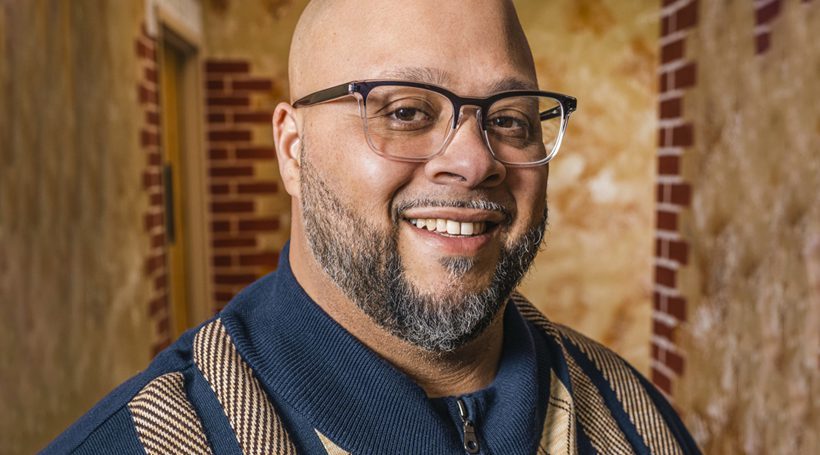Victor Jimenez photo by David Michael Howarth
When he was nearing his release date from prison, Victor Jimenez had mixed feelings about getting out. He figured it was just a matter of time before he would be locked up again.
The odds were not in his favor. The Vineland resident, then 34, had been in and out of correctional institutions since he was 11. He was estranged from family and most of his job experiences were not the kind you’d highlight on a resume. “I was a gang leader, the worst of the worst,” says Jimenez. “I didn’t think I would get another chance in life.”
Still, when he landed at a halfway house in Bridgeton, he committed to making the most of every service, training and therapy session. Obtaining a license to drive trucks was not his dream, but a means to an end. The long hours on the road gave him lots of thinking time, while he also pursued college credits and rebuilt the trust of his family.
Now, 10 years later, both gang life and truck driving are behind him. A licensed therapist and pastor, Jimenez tells his story as both a cautionary tale for the teens he mentors – many who have already had brushes with gang life – and as an example for the ex-offenders he ministers. People can change, he says, with the right kind of help.
“I realized my councilors weren’t lying. They really did have all the resources I would need to start over,” says Jimenez. “It may sound cheesy but the staff believed in me, and I didn’t want to screw that up – not for them and not for myself.”
Reducing the prison population while improving public safety and helping ex-offenders move on with their lives is an ongoing conversation in the state, especially since nearly 40% of inmates were released during the height of the pandemic. The early releases were made to slow the spread of Covid in prisons and jails.
Community-based reentry programs – including the Bridgeton halfway house where Jimenez served out the remainder of his term – have been credited with helping inmates move on to productive lives. New Jersey has been singled out for significantly reducing its rate of ex-offenders who end up back in correctional facilities. Before the pandemic, the rate was 30 percent, significantly lower than the 50 percent national average.
“When you’re in prison, time stops for you,” says Daniel Lombardo, president/CEO of Volunteers of America Delaware Valley. “The last memory you have of being in your community may be from 5, 8 years ago, depending on your term. Halfway houses provide a needed transition, helping inmates understand and accept that a lot is different now, from new bus routes to how their family has changed in the time they’ve been away.”
The nonprofit operates 3 halfway houses in Camden that, under contract with the N.J. Department of Corrections, provide a structured environment and services to help inmates transition to life on the outside. This includes help overcoming drug and alcohol addiction, employment placement, life-skills training, basic education, counseling services, medical services and referrals to social services agencies. In addition, the agency runs day treatment programs for clients on parole.
Safe Return, Volunteer of America’s reentry program for anyone released from prison within the last 3 years, has taken on a crucial role to help released inmates who did not receive a plan to help with their transition. Located throughout South Jersey, Safe Return counselors work with local police to connect released inmates with community groups offering anything from free hot meals and rides to emergency shelters to help finding jobs and housing.
The Kintock Group, which operates 2 halfway houses in Bridgeton and programs for people on parole, created Vantage Point in response to 2020’s mass release of inmates. Similar to Safe Return, counselors went throughout South Jersey communities to find and help individuals with the abrupt transition.
“Sometimes it was as simple as giving them a winter jacket or cell phone, which they weren’t allowed to have inside prison or jail, and then they would be able to connect to us in the moment or down the line,” says Paul Taggines, chief operating officer of The Kintock Group. “No matter how we get to them, our goal is to help them stabilize on their way out of prison.”
Both Taggines and Lombardo say safe housing is among the biggest challenges their clients face. Without it, the chances they will return to criminal activity greatly increases. Both organizations work with outside agencies to find temporary and more permanent solutions.
“Sometimes we are in a situation where the clients we work with have horrible credit,” he says. “You’re not going to get a utility company to turn on the lights, let alone get a lease in that situation. We’ll sign a master lease for an apartment and work with them for a year to 18 months, whatever it takes, to help build a credit history so they can get their own lease.”
As a partner in The City of Hope, an enclave of 6 prefabricated “tiny homes,” The Kintock Group is trying a new approach. The 100-square-feet units are private but share a bathroom, picnic area and community room. It is designed so its 6 residents, who are all on parole, can support each other.
Operating the Village of Hope has taken a village. Besides The Kintock Group, it involves Gateway Community Action Partnership, the Reentry Coalition of New Jersey, with additional support from the New Jersey State Parole Board, City of Bridgeton and local law enforcement and first responders.
“Our number-one goal is to get them working and stable,” says Taggines. “It’s not a solution, but it’s part of a solution.”













